Country Music Blu-ray Movie
HomeCountry Music Blu-ray Movie 
Ken BurnsPBS | 2019 | 941 min | Rated TV-PG | Sep 17, 2019
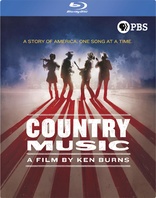
Movie rating
7.9 | / 10 |
Blu-ray rating
| Users | 0.0 | |
| Reviewer | 4.0 | |
| Overall | 4.0 |
Overview
Country Music (2019)
The story of the creation of modern Country music.
Narrator: Peter CoyoteDirector: Ken Burns
| Music | Uncertain |
| Documentary | Uncertain |
Specifications
Video
Video codec: MPEG-4 AVC
Video resolution: 1080p
Aspect ratio: 1.78:1
Original aspect ratio: 1.78:1
Audio
English: DTS-HD Master Audio 2.0
English: DTS-HD Master Audio 5.1
Spanish: DTS-HD Master Audio 2.0
Subtitles
English SDH, Spanish SDH
Discs
Blu-ray Disc
Eight-disc set (8 BDs)
Playback
Region A (locked)
Review
Rating summary
| Movie | 5.0 | |
| Video | 4.0 | |
| Audio | 4.5 | |
| Extras | 4.0 | |
| Overall | 4.0 |
Country Music Blu-ray Movie Review
Reviewed by Brian Orndorf September 19, 2019For his latest long-form documentary, director Ken Burns tackles the world of country music, which is not a subject I’m sure many expected him to give his traditional in-depth treatment. After recently exploring the life and times of The Roosevelts, Jackie Robinson, and filing through the history of The Mayo Clinic, Burns delivers a surprise with “Country Music,” which gifts itself 16 hours of screen time to detail the history of American folk music and the scores of artists who helped to put it all together over the course of 60 years. “Country Music” is a traditional Burns behemoth (scripted by Dayton Duncan and narrated by Peter Coyote), and it deals with its fair share of tragedy and psychological darkness, but there a brighter sense of exploration as Team Burns works through musical history, spotlighting all the fantastic artists and extreme personalities found in the genre, which has welcomed some extraordinary talents.
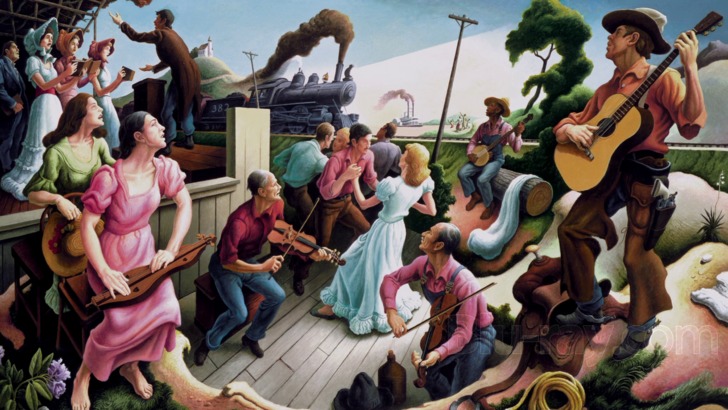
There are eight episodes in “Country Music,” with each chapter examining a handful of years in the life of a musical movement. Burns opens in the 1920s and ends in 1986, leaving himself plenty of room to inspect the mileage of the genre, which began with performances in fields and on front porches and ended up in football stadiums. The production has collected over 100 interviewees for the project, and they add everything possible to the mix, with the likes of Dolly Parton, Rosanne Cash, Garth Brooks, Roy Clark, Hank Williams, Jr., Charley Pride, Loretta Lynn, Vince Gill, Ricky Skaggs, Marty Stuart (the most dapper man in show business), Emmylou Harris, and Willie Nelson contributing amazing anecdotes and lived-in perspective when it comes to examining what it takes to succeed in country music. Burns doesn’t rock the boat with the mega-doc, keeping to his signature style and pacing, and while the grand movement of experiences is tended to, taking the action all around the American south and west, personal histories are prized most highly by the mini-series, taking time to get to know backstories and challenges facing those who decided to make a career out of “hillbilly” music.
Episodes
“The Rub (Beginnings-1933)” (113:11)
Entering the 1920s, the “follow the fiddle” mentality began to dominate regional music, with “Fiddlin’” John Carson amassing tremendous popularity as he traveled across the south sharing his musicianship. Radio exposure created hit artists, and the making of phonographs secured monetary success, while country music itself was reimagined from old European folk songs. The introduction of the banjo and guitar developed local sounds, and racial divide was briefly forgotten as black and white music became one, encouraging the development of the “hillbilly” movement and the creation of the Grand Ole Opry. The legacy of producer/publisher Ralph Peer is recounted, along with the debut of powerhouse acts The Carter Family and Jimmie Rodgers.
“Hard Times (1933-1945)” (114:30)
As the Depression cripples America, radio becomes a key force in the free distribution of country music, offering exposure to the Maddox Brothers and Rose and Gene Autry, who perfected the image of the “singing cowboy,” launching hundreds of imitators (including Roy Rogers) as he made his move to Hollywood, eventually transforming himself into a tycoon. Trying to keep up with the industry, The Carter Family experienced challenges to personal relationships, forcing them to evolve as a group. The saga of Bob Wills is recounted, while distinct talents and personalities such as Roy Acuff and Minnie Pearl help to cement The Grand Ole Opry as primary player in the development of Nashville as the home for country music. And with the arrival of World War II, music stars adjust to national duty and fame, growing powerful as military radio shares their tunes.
“The Hillbilly Shakespeare (1945-1953)” (114:57)
The development of honky-tonk singing introduces new talent to the scene, with the troubled saga of Hank Williams and his industry dominance and downfall detailed in full. Other acts are analyzed, including Bill Monroe, Earl Scruggs, The Stanley Brothers, Little Jimmy Dickens, and Eddy Arnold, who pursued a pop crossover sound. In 1949, Billboard finally settles on “Country & Western” as a category for the new style of folk music, while the genre sees a rise in showmanship, with bands putting effort into style and flamboyance to wow audiences. Female identity in the male- dominated industry starts to come into focus, with June Carter and Kitty Wells, who scores a hit with “It Wasn’t God Who Made Honky Tonk Angels.” And vivid, heartfelt storytelling in country music is examined, impressing other performers from different genres.
“I Can’t Stop Loving You (1953-1963)” (112:34)
Ready to take on Memphis with his distinctive voice, Johnny Cash commences a career of musical success and domestic heartbreak, eventually overturning his life to be with June Carter. Unable to find his sound on his own, Elvis Presley turned to country music to help inspire his early hits, while his developing rockabilly sound enticed a new generation of performers to join the scene. While working as a songwriting team, couple Felice and Boudleaux Bryant found their breakthrough during this time period, feeding tunes to needy artists, including The Everly Brothers. In Nashville, Music Row is established, creating recording studios to generate a growing desire for country music, while Ray Charles takes a creative gamble in 1962, releasing “Modern Sounds in Country and Western Music,” which becomes a smash hit. Individual voices are explored, with Willie Nelson and Loretta Lynn joining the movement, and the sad saga of Patsy Cline is detailed.
“The Sons and Daughters of America (1964-1968)” (115:50)
The grind of touring takes its toll on many country music artists, who turn to increasingly flashy outfits to help sell themselves to the public. Johnny Cash continues his downward spiral into drugs and career frustrations, trying to keep up with cultural shifts while pursuing June Carter. The magic of session musicians on Music Row is highlighted, along with the changing face of Nashville, moving from the “Athens of the South” to “Music City U.S.A.” In California, The Bakersfield Sound begins to take shape, while artists such as Merle Haggard, Buck Owens, and Charley Pride are examined. And growing confidence in female voices is detailed, with singers such as Connie Smith, Bobbie Gentry, Jeannie C. Riley, and Loretta Lynn developing reputations for gritty tunes about feminine issues. Dolly Parton also begins her career ascent, offering a heavenly voice and songwriting mastery to generate a name for herself.
“Will the Circle Be Unbroken (1968-1972)" (113:00)
Feeling left out of the popularity party, bluegrass receives an overdue revival during the late 1960s, welcoming a new generation of fans and artists. New talents such as George Jones and Tammy Wynette hit the scene, and novelty songs are celebrated, with comedy becoming part of country music’s identity. Music Row is hit with a wave of folk music, with artists such as Bob Dylan coming to Nashville to declutter their sound. Johnny Cash continues a career rebirth, ending up the most popular country music artist in circulation, using his television variety show to showcases musicians and commentary on American life. Also on T.V. is “Hee Haw,” which threatens to undo all sorts of image control with its crude depiction of hillbilly life. Talents such as Kris Kristofferson emerge, and Willie Nelson tries to find his place in the business. And the generation gap is felt as older artists work to accept a new wave of country music talents.
“Are You Sure Hank Done It This Way? (1973-1983)” (141:05)
Finally reaching the end of its usefulness, the Grand Ole Opry relocates from the Ryman Auditorium to the Opryland Resort. The rise of Dolly Parton is tracked, from her early years of industry subservience to the explosion of her fame. Country music’s fascination with duets is studied, with George Jones and Tammy Wynette finding tremendous success together. “Countrypolitan” is branded as the new sound, with outsiders such as Olivia Newton-John and John Denver scoring hits. The sagas of Ricky Skaggs, Waylon Jennings, Johnny Rodriguez, and Guy Clark are shared, while a new generation of musicians emerge to take over, with the likes of Emmylou Harris and Vince Gill changing the face of country music. Outlaw music is also highlighted, including Willie Nelson, who takes his career to Austin for a fresh start. Career trials are studied for second- generation names Hank Williams, Jr. and Rosanne Cash, and the country music explosion of the 1980s is celebrated, with radio stations popping up everywhere and acts like Alabama graduating to arena shows.
“Don’t Get Above Your Raisin’ (1984-1996)” (115:44)
With the 1980s in full swing, Johnny Cash is dropped by his record label, while daughter Rosanne hits the top of the charts with her first album. With country going pop, a few “Neo-Traditionalists” elect to remain with country’s roots, with George Strait, Randy Travis, Reba McEntire, and The Judds a few of the names forming careers at the time. While artists like Vince Gill struggle to find their sound, Garth Brooks breaks through, inspiring unprecedented success, which ends up hurting the record business, leaving those on the outside to the Americana movement, restoring heart to the music. Fan connections are explored, as is the death of Johnny Cash.
Country Music Blu-ray Movie, Video Quality 
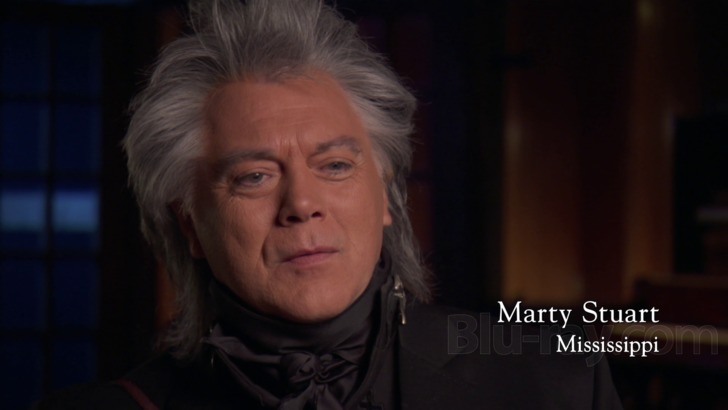
The AVC encoded image (1.78:1 aspect ratio) presentation offers a warmer look to "Country Music," which falls in line with other documentaries from Ken Burns. Interview footage is soft, but some detail remains communicative in facial particulars and fibrous clothing. Visits to the archive are satisfactory, delivering sharpness on photos, while film and video sources are pushed to their limits in terms of clarity. Colors are defined adequately, surveying various outfits and interview lighting, and pictures offer bright primaries, especially with street signage. Skintones are accurate. Delineation is acceptable. Some compression issues are spotted, with a few interview segments displaying faint blockiness and banding is periodically detected.
Country Music Blu-ray Movie, Audio Quality 
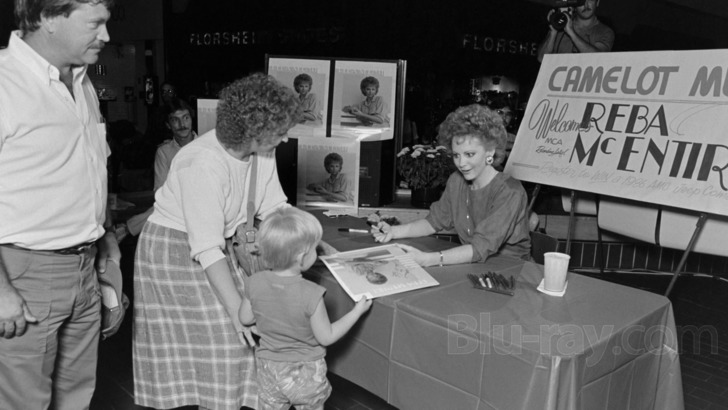
The 2.0 DTS-HD MA sound mix delivers a straightforward listening experience, with welcome sharpness on narration and interview footage, preserving accents and personality quirks. Archive footage is also intelligible, restored with care. Wall-to-wall music is sharp, with defined instrumentation that receives a healthy workout as pretty much all instruments are handled during the episodes. Driving bass and percussion beats are retained, as is crisp acoustic guitar strumming. Atmospherics register as intended, generating crowd interaction and street life.
Country Music Blu-ray Movie, Special Features and Extras 

Disc 1
- Interviews (HD) include "Ketch Secor: Old Fiddle and Banjo Tunes" (3:26), "Rhiannon Giddens: The Mix in Country Music" (7:45), "Charlie Daniels: The Devil and the Fiddle" (3:37), "The Oak Ridge Boys: Farther Along" (1:39), "Old Hymns: Dwight Yoakam and Betty Johnson" (5:03), and "Dolly Parton: Pretty Fair Maid" (1:35).
- Interviews (HD) include "Will the Circle Be Unbroken: Country Music's National Anthem" (3:27), "Wynton Marsalis: Wildwood Flower" (1:04), and "Betty Johnson: The Johnson Family Singers, 1930s" (3:44).
- Interviews (HD) include "Ralph Stanley: The First Song Mother Taught Me" (3:12), "Hank Williams: The Songwriter and the Performer" (8:34), "Randy Scruggs: The Carter Scratch, Travis Picking, Doc Watson" (3:16), "John McEuen: Earl Scruggs' Banjo Style" (5:36), and "Don Maddox: The Most Colorful Hillbilly Band in the World" (7:24).
- Interview (HD) include "Elvis The Hillbilly Cat" (8:01), "Patsy Cline: Tough Edges, Big Heart" (8:25), "Mel Tillis: Learning to Talk Through Singing" (3:34), "Johnny Cash: Poet and Performer" (12:05), and "The Bryants and Rocky Top" (1:42).
- Interviews (HD) include "Music Row's A-Team" (10:07), "The Genius of Roger Miller" (4:23), "Jeannie Seely: Women in Country Music" (7:33), "Loretta Lynn on Songwriting" (2:06), and "The Artistry of Merle Haggard" (3:45).
- Interviews (HD) include "Help Me" (11:58), "Ruby, Don't Take Your Love to Town" (4:18), "Kris Kristofferson's First Song" (1:35), and "Old Dogs, Children and Watermelon Wine" (2:59).
- Interviews (HD) include "He Stopped Loving Her Today" (15:14), "Dolly Parton: The Songwriter and the Celebrity" (7:26), "Johnny Cash: Following the Gospel" (11:57), and "Hank Williams, Jr.: On His Own" (2:02).
- Interviews (HD) include "Marty Stuart's Mandolin" (1:56), "Johnny Cash: His Legacy" (5:19), "Marty Stuart: Back to the Source" (1:43), and "The Song Into Outer Space" (33:23).
- "Behind the Scenes at Florentine Films" (13:02, HD) makes the trek to the New Hampshire compound owned by Ken Burns, who explores the incredible labor required to assemble his documentaries. It's a group effort, and the featurette details specific jobs and passions for the topic, along with help from country music artists, including Marty Stuart and Kathy Mattea.
Country Music Blu-ray Movie, Overall Score and Recommendation 
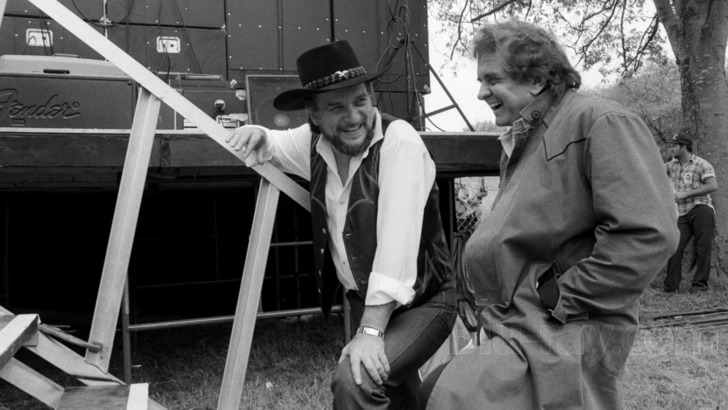
As with most productions from Burns, there's so much to appreciate here. And for those who are new to the world of country music, the episodes provide a wealth of information, detailing personal and economic horrors, and the joyfulness of industry success, highlighting the primal connection between the genre and its fans. "Country Music" doesn't shy away from the troubling aspects of certain legends (Johnny Cash is arguably the lead character here, and his personal conduct is problematic to say the least), but Burns and his team always return to the roots of country music, celebrating its spiritual and visceral appeal, shaping an incredible portrait of growth and change out of a head-spinning amount of archival materials and interviewees, with most delighting in the chance to share old stories and celebrate the musical kingdom they adore.
Similar titles
Similar titles you might also like

The Bee Gees: How Can You Mend a Broken Heart
2020

Springsteen & I
Bruce Springsteen
2013

Queen Rock Montreal & Live Aid
1981

Pearl Jam Twenty
2011

Oasis: Supersonic
2016

Searching for Sugar Man
2012

Jazz on a Summer's Day
1959

Marley
with Bonus Disc
2012

20 Feet from Stardom
2013

Score: A Film Music Documentary
2016

Amy
2015

Soul Power
2008

The Prodigy: World's on Fire, Live
2010

The Promise: The Making of Darkness on the Edge of Town
Bruce Springsteen
1977-2009

Kurt Cobain: About a Son
2006

It Was Fifty Years Ago Today !
The Beatles: Sgt Pepper and Beyond
2017

I Am Trying to Break Your Heart: A Film About Wilco
2002

Beats, Rhymes, & Life: The Travels of a Tribe Called Quest
2011

Zappa
2020

The White Stripes: Under Great White Northern Lights
2009
